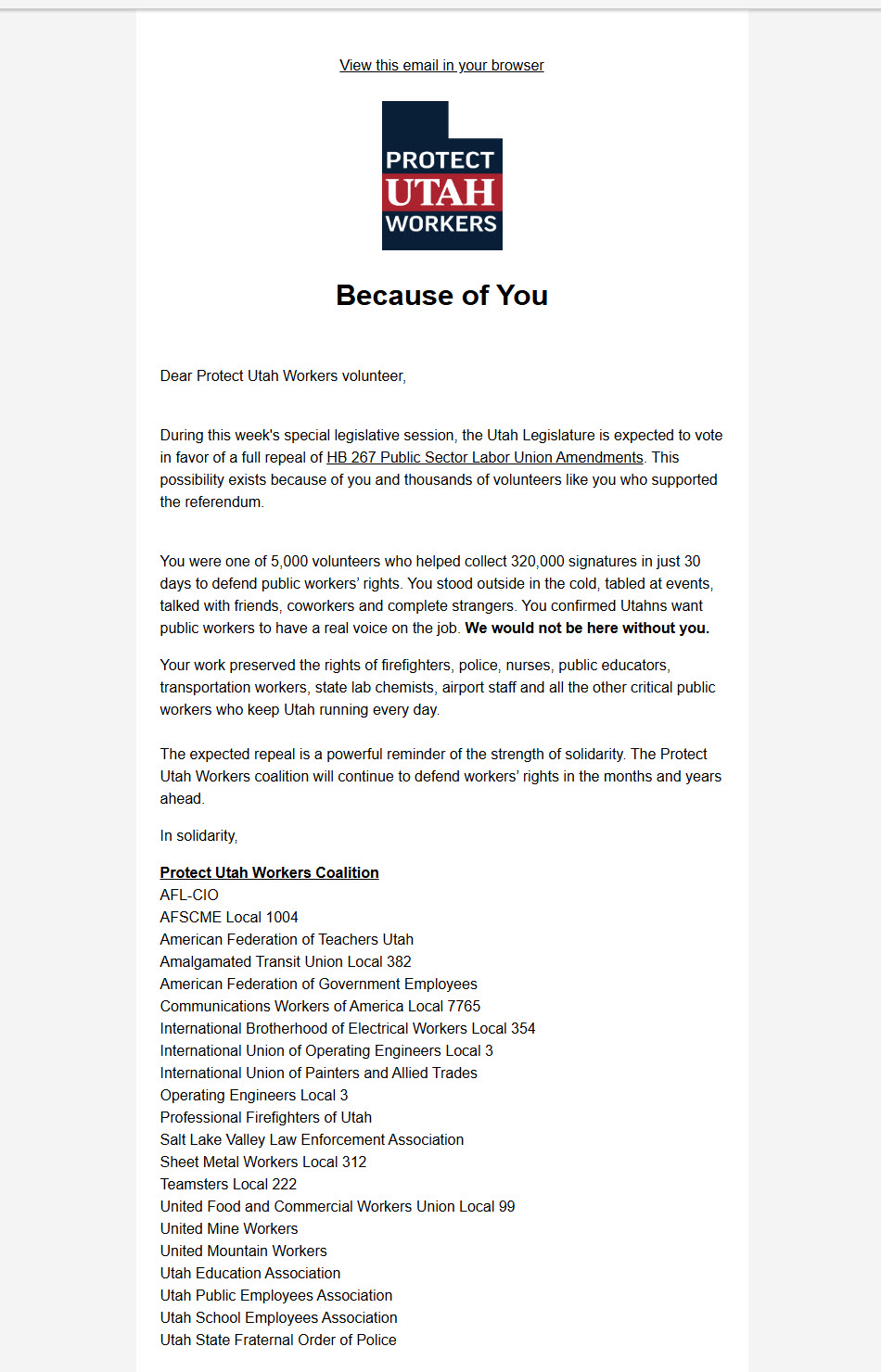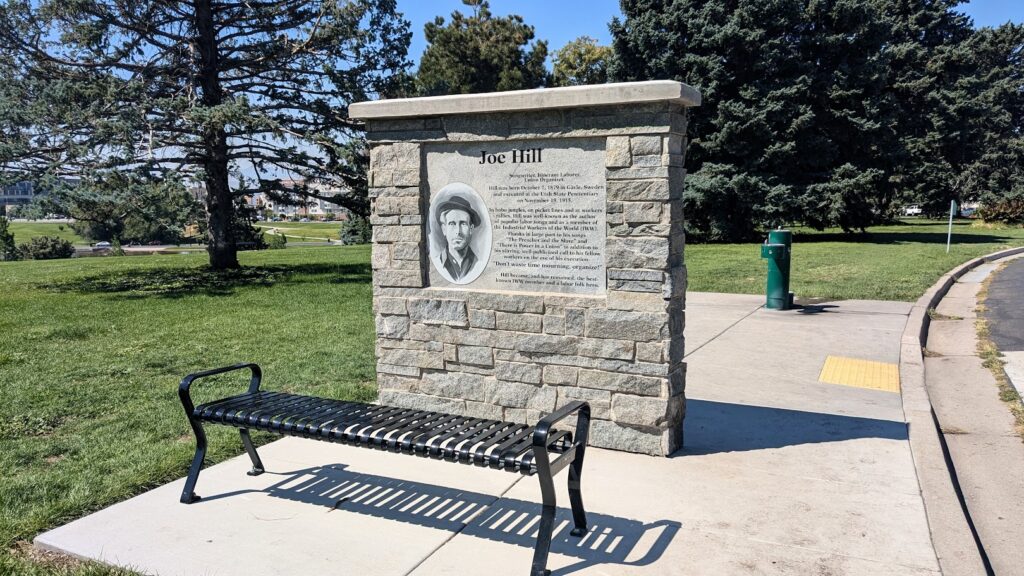I’m currently reading Dr. Donna Hicks’ book “Dignity: Its Essential Role in Resolving Conflict” leading up to her keynote address at the Dignity Leadership Summit taking place in Salt Lake City, Utah. I’m conflicted on the topic, mainly due to the helplessness I feel in the socio-political climate of the US and the world at large. I thought I would share my thoughts as I read through the book.
My preface is that these are simply notes of mine as I read the book. I make observations, ask questions, and reference what is in my known world to connect to what the author writes.
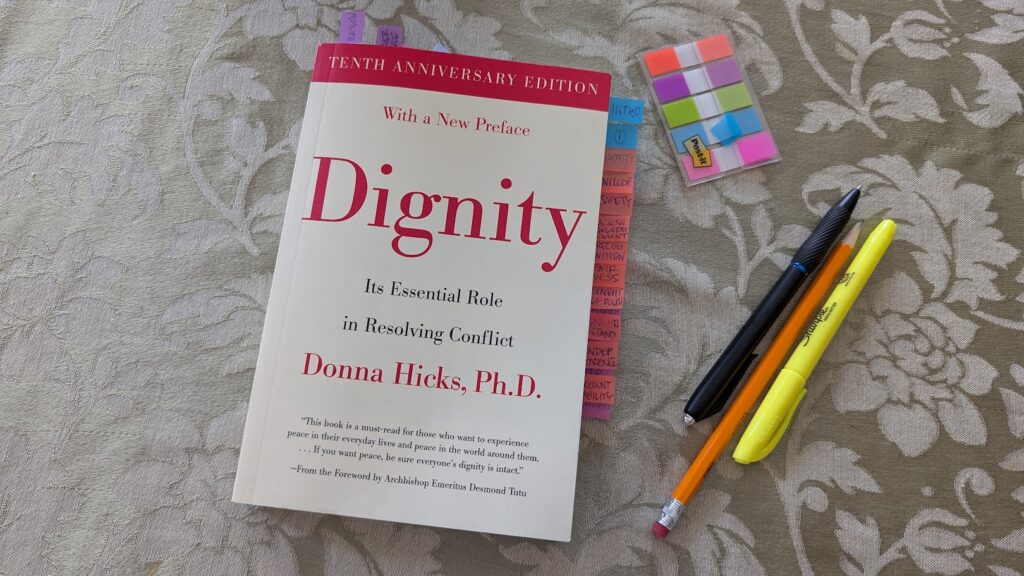
Dr. Hicks presents what she calls the Dignity Model, with ten elements of dignity; and she expands further by writing about the ten temptations to violate dignity. In the preface she includes the opening words of the Universal Declaration of Human Rights:
“Whereas recognition of the inherent dignity and of the equal and inalienable rights of all members of the human family is the foundation of freedom, justice, and peace in the world…”
United Nations, 1948
After reading the book, my question is how we can embrace dignity in ourselves but know that we will suffer indignity, and watch our communities suffer indignities that we cannot control. My question is how loss of rights, of curtailed freedoms, lost opportunity, and of loss of lives does not result in a loss of faith? There is a certain amount of jadedness, of bitterness I have that I can’t seem to let go of, in part because I have lost faith in the general goodness of people that I once trusted was there.
I am starting to believe that corruption is a rust that goes through our societal values. I am concerned that ignorance, hate and greed is more prevalent than humility, understanding and empathy.
I am concerned that partisanship, tribalism, and righteousness get in the way of humanity, a broader sense of belonging, and a sincere desire to help one another.
Our fight is real, and it has become existential. We are experiencing literal genocide, displacement and suffering take place in front of us, and watch as our leaders give praise to the perpetrators. Our own leaders show only hubris, and seek unfettered power by planning and taking action to harm anyone who does not contribute to their corruption. Where does our dignity fit in all of this?
There is an assumption that we have a common emotional vulnerability, and I’m not sure that I believe that premise.
A Foundation for Dignity is a Common Reality
My first assertion is that dignity cannot exist without a common reality of what values we hold, and how worth is measured. The book’s focus is on dignity, but words like worth, and honor, and respect show up and rival it. On p.3 respect (earned) is differentiated from dignity (a birthright of value and worth). Both require care and attention.
In order to have dignity:
- Safety and trust are essential
- Science as a method of understanding the world around us is essential
- Logic prevails over illogic, and critical thinking is necessary
- Truths may include different viewpoints but must be separated from deceit
- Bias exists. We must be able to recognize it in ourselves as quickly as in others
- “Awareness requires self-understanding and acceptance. It requires work” (p.15)
- Last, I would add that humans are social animals, meaning we are of this earth and are part of it. We do not hold a “special status”.
“It’s not just our indignity; it is the indignity of those who we love and care for. It is the loss of well-being of a community of people.”
– From my book notes
A Hierarchy of Needs
Dignity is not easily found when food and shelter are gone, or when we are without safety, or when community is taken from us. We can choose to be dignified in our thoughts and actions, but dignity can be stripped away from us. It is not our self-worth that I’m speaking of here; dignity is more closely related to esteem than it is to worth.
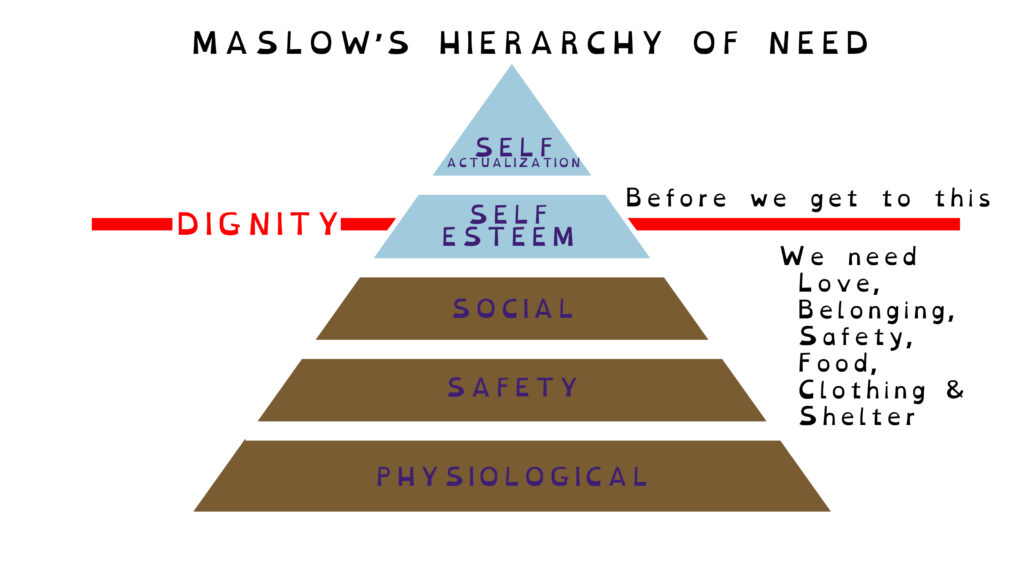
Taking away the foundation does not attack our individualism, rather it attacks our humanity. Inherent self-worth can be had without dignity, which is a societal value.
Burton’s ontological needs (p.27) of identity, recognition, security and belonging are part of the foundation in Maslow’s hierarchy. Fulfillment of these needs is essential to create a foundation for which dignity can be built upon.
Categorical Imperatives
On p.4 Immanuel Kant is referenced as introducing the idea of the “categorical imperative”; i.e. to “act in such a way that you always treat humanity, whether in your own person or in the person of any other, never simply as a means, but always at the same time as an end.”
Kant surmised that it is “unethical to exploit people or treat them merely as instruments to further one’s own personal goals and interests.” I would go further to say that it is morally wrong to treat others as chattel, or worse, to have no consideration for humanity whatsoever.
On p.10, Hicks summarizes Lindner and Ury in saying “We are becoming aware of our outdated acceptance of humiliating ways of ordering society, and a new human rights culture is taking shape; the value of each and every human being is being recognized.” My response to this is that we are aware, but re-ordering. I agree with Hicks, but I am skeptical.
My concern is that we have actors in today’s society who act with malice, who are willing to deceive and sow distrust for the purpose of acquiring and maintaining power over others. They are driven by greed, fear and hate; and view ruthlessness as strength.
There is an ethical dilemma when the actions of a malevolent person trump the dignity, security and existence of others. How can we value redemption of one individual whose actions may cause harm to many? How do you negotiate with someone who carries no shame?
Sidenote: Speaking outside of this review, I challenge Kant’s notion that suicide is morally wrong. Calling suicide a moral issue speaks more about society’s willingness to ignore personal suffering, and its failure to support and accept individuals who struggle for connection within our society.
It is Connection That Drives Us
Connection is understanding, empathy, acceptance and support. Connection is listening. Connection is contextual. Connection is allyship, a word that I do not see in Hicks’ book.
- Connection > Respect
- Connection > Esteem
- Connection > Dignity
See Lost Connections, and Stolen Focus both by Johann Hari for an interesting take on western society’s root causes of depression and anxiety. I align to his thoughts that connection is what drives us.
Fun distraction: Watch Abbott Elementary S2E3 “Story Samurai“. Jacob learns to come to terms that he is not “cool”. He learns that the students call him Mr. C because he is corny, and that his peers also think of him this way. His persona is reshaped but he realizes that he is loved and accepted. This is an example of connection mattering more than dignity.
The Five Dysfunctions Model
I want to reference a book by Patrick Lencioni on The Five Dysfunctions of a Team, which is an excellent reader on building functional teams, that focuses more on the establishment of trust, healthy conflict and accountability of its members. This model could easily be applied to teams working towards conflict resolution, just as Hicks’ model is intended. Both models have precepts of basic needs being met as a foundation.
The Five Dysfunctions Model
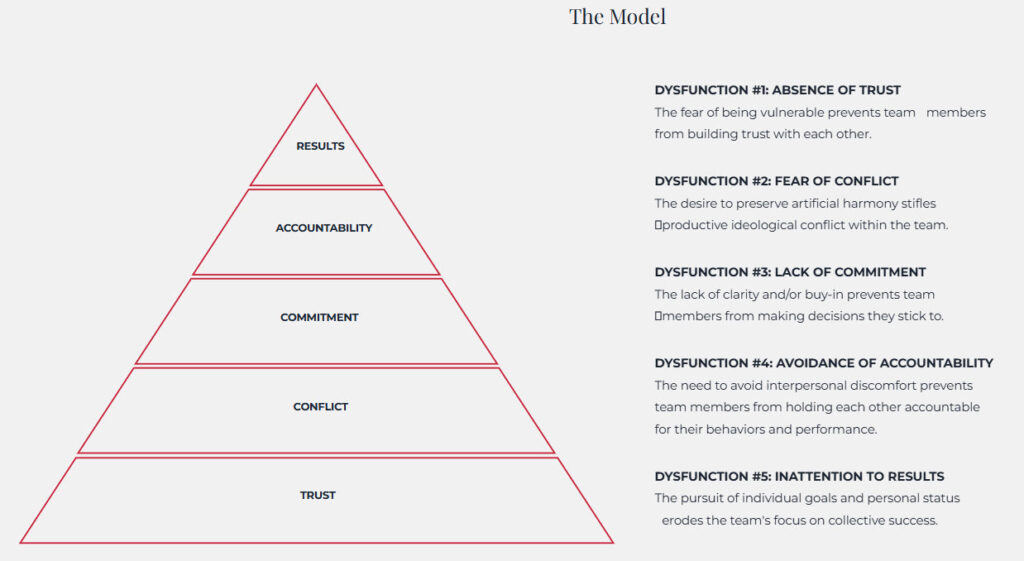
The Ten Elements of Dignity
Dr. Donna Hicks introduces her model with the following elements – there is no “stack” or “pyramid” built in her model (note that I comment on numbers 2, 6, 7, 9 and 10):
- Identity: an introduction of “I” and “Me”; should add “We” that comes later (see Robert Kegan p.152)
- ≠ Inclusion: acceptance and belonging (my problem here is the paradox of inclusion when looking at the person, their ideology, and their (in)actions together. I cannot separate them)
- Safety: free to speak without retribution
- Acknowledgement: see and acknowledge the indignities of others
- Recognition: show others that they are seen, heard and understood
- ≠ Fairness: treat others justly, with equality and evenhandedness (without trust, I cannot extend good faith to those who will abuse the privilege – i.e. an agreed ceasefire is violated consistently by one party)
- ≠ Benefit of the Doubt: treat people as trustworthy (I struggle that all people have good motives or act with integrity – i.e. a delay plays to the advantage of a party that will undermine a negotiation, or keep food and aid from victims of war)
- Understanding: believe that what others think matters I LOVED THIS QUOTE: “Seeking understanding is one of the easiest ways of honoring dignity. Allowing people to feel understood is just one short sentence away: “Tell me more”.” (p.85)
- ≠ Independence: encourage others to act on their own behalf (this should always be a first principle, but there are times when allyship is needed)
- ≠ Accountability: take responsibility for your actions (all parties must be accountable, and this extends far beyond violations of dignity)
I think you can see this is where I really begin to struggle with Dignity as an underlying core value for which unresolved conflict can be addressed. There must be a basic level of trust, of constraint, of essential humanity, of broad accountability to move forward.
In the section on Benefit of the Doubt, there is a poignant story of Nelson Mandela who says “I loved even my enemies while I hated the system that turned us against one another.” (p.75) He also says “Man’s goodness is a flame that can be hidden but never extinguished.” (p.76)
Not everyone is a leader, and far fewer become a moral authority. Even fewer survive what Nelson Mandela did, and I will use Alexei Navalny as an example. I question the value of giving the benefit of doubt to even one individual whose actions cause harm to many. Is there not an ethical dilemma presented here? Is it not different to bear our own suffering, but do nothing for the suffering of others?
In the section on Accountability, I pondered what if there is no diplomat to negotiate, or if we are faced with institutions built on greed, prejudice and fear? There must be honest arbiters with agency to represent change.
Discipline is mentioned on p.119 under False Dignity, but is not brought up in context of the first 10 elements. I think this, Humility and Reflection, should be elements of consideration.
Fun Distraction: If you were to program Dignity into an AI model, what would it look like? What would happen if you were to run a Monte Carlo exercise on the model?
The Ten Temptations to Violate Dignity
These are not all presented as antitheticals of the Ten Elements, rather it exists as its own list of detriments to Dignity.
- Taking the Bait: the lesson here being to show restraint, and noting that action must be measured against a consequence of inaction. This quote in particular was striking: “…know that we have the capacity, in the service of self-preservation, to do great harm to one another, we will be stuck in the never-ending cycle of indignity.” (p.101)
- Saving Face: “The dread of having our inadequacy, incompetence, or lack of moral integrity made known is enough to turn us into liars…” (p.103) reminded me of this recent unattributed comment about a political figure: “When he says he knows nothing he knows everything. When he says he knows everything he knows nothing.”
- Shirking Responsibility: (as an antithetical to #10 Accountability) An important lesson from this is that when we care, we learn, and this builds strong relationships.
- Seeking False Dignity: a short summary might be to not seek false praise or flattery, or accept that our status as a human is tied to an external measure of success. A concern I have for this is that Hicks’ references the individual perspective and not society generally, or where we find ourselves historically within it.
- Seeking False Security: be willing to address the risk of the unknown. “Any relationship in which your dignity is being routinely violated is not a safe relationship, no matter how much you deceive yourself into thinking it is.” (p.124) needs to be applied at a larger level. It pertains not just to relationships, but representation, and employment, and society at large.
- Avoiding Conflict: a key reason I brought up Lencioni’s Five Dysfunctions is because it specifically calls out healthy conflict as a necessary step for teams to go through. Conflict should not only include standing up for yourself, as Hicks states, but should also include allyship. There is a risk in conflict. Understand the fight before you step into it. There is a great comment about ‘optimal conflict’ by Kegan on p.154 to challenge how we make meaning.
- Being the Victim: possibly versus playing the victim? Know the difference. Our self-awareness and objectivity are key to understanding. Our willingness to hear others feedback and process it comes next.
- Resisting Feedback: continue to be curious. Continue to receive, accept and process change.
- Blaming and Shaming Others as Deflection: “Safeguarding our dignity when faced with a threatening situation requires us to develop both self-restraint and self-assertion.” (p.168)
- Engaging in False Intimacy and Gossip: “There is nothing like good dirt to liven up a discussion.” (p.171) Speak truth about yourself; invite others to do the same.
For the topic of False Intimacy and Gossip, I want to juxtapose that with commiserating and discussing rumors generally. A trusted circle is often used to share information, or needs to be used as a sounding board, or where to go for advice. It’s “spill the tea” but also “let’s clean that up”. Very often, the person discussed wields a power imbalance, or shows unreliable behavior.
Tiering the Elements of Dignity
I wanted to relate the elements to some order of tiered dependence, and I also wanted to see if there was an association between the elements and the temptations. This is what I came up with.
My intent here is to think about how some things (like safety) are essential in order to do anything meaningful. Then there are elements we are directly responsible and solely accountable for, and there are elements that we extend to ourselves and to others.
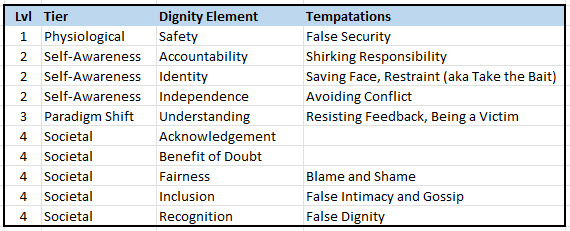
On Reverence and Awe
Starting on p.67-69, I especially like what was said in this section on Recognition. The capacity to be in awe and in reverence of a force or forces greater than ourselves is a reminder of the incredible power of humility. (I made a silly note that this was the time to watch more Kaiju films.) These quotes in particular captured me:
“The something greater could be God for those who are religious, or ideals like truth and justice, which captivated the Enlightenment philosophers, or the magnificence of the universe, which is enough to bring Richard Dawkins, an atheist, to his knees.”
“One of the hallmarks of good leadership, then, is the capacity to feel awe and wonder at something greater than oneself, and this feeling acts as a check on arrogance.”
Humility, then, is essential for our ability to see ourselves and the role we play in a grander picture of the world and universe that we are a part of. Humility is “necessary to avoid the temptation to abuse one’s power by harming, exploiting, and disempowering others.” (p.69)
On Social Values of Shame, Ridicule and Satire
There is social value to shame, ridicule, satire and for comedy; but what part does dignity play here? Hicks states on p.22-23 “Our interpretation of what happens in the world is dependent on our experience of it [shame]”. Yet we find disciples of hubris among us.
- There is a notable fear of humiliation, except when there isn’t. Senator Ted Cruz, Senator Mike Lee, and Vice President JD Vance in their about-face relationships with President Donald Trump are prime examples of this.
- Lying, deception and cover-up are not only employed in self-defense. Senator George Santos literally made a career and was elected to the Senate amidst his willful lies, fraud and corruption.
On Reconciliation
One of the observations I want to make is that reconciliation is not always possible. It may never occur. It would be better to add one more chapter on unreconciled indignities, or “living with indignity”, because that is the circumstance for many.
“Because Mandela’s sense of his own value and worth was so deeply ingrained, he never lost sight of the inherent value and worth of others, no matter how badly he was treated. His sense of dignity is the source of his humility. It is humanity itself that he respects – not just his own but that of every human being. Keeping that truth to the fore is an astonishing human achievement.” (p.76)
“The responsibility is ours to stay anchored in the truth that, as human beings, we are the embodiment of dignity.” (p.139)
What answer is there for unresolved conflict? What of justice not found? What of our own perceptions of safety when the violator just “gets away” or isn’t part of the recognition, or healing? The violation remains. It is inevitable, but the weight of things, whether one or many, has a tendency to shape us.
I am troubled about finding resolution when offending parties do not have integrity. They willfully disregard, lie and are in contempt of words. There is no honor in their actions; they admire ruthlessness; they seek power without humility. The response to this cannot be to simply persevere through it all.
Much of the book describes suffering. Dignity does not take away suffering, and it does not make it tolerable. Dignity can be a lifeline though; in that it cannot be taken away unless you choose to let it go.
“It’s not necessarily about meeting in the middle; but is there a third space?“
Evan Fowler, DEI Facilitator, Project Common Bond
Dignity and a Dialog to Avoid Conflict
Although the topic of the book is on using Dignity to resolve conflict, it’s worthwhile to point out that Dignity can and should be used to avoid or dissolve conflict. Dignity is, after all, a tool of diplomacy.
So the other part of the story should be of preventing conflict. How do we use dignity to restore dialog? How do we ensure that dignity is more present in the words and actions of ourselves, our politicians, business leaders, in community, in our news and in our places of gathering?
Suggested Next Read
I already started this, but want to review and comment next on “Too Much and Never Enough: How My Family Created the World’s Most Dangerous Man“, by Mary L. Trump, PhD. This will likely be a very significant contrast to “Dignity”. Much of my reading on Dignity has led to thoughts on how DJT acts in opposition to dignity but is still projected and supported by an inner circle, and by his followers, who are devout to his political figure.
About the Reviewer
You can learn a bit more about me here.

